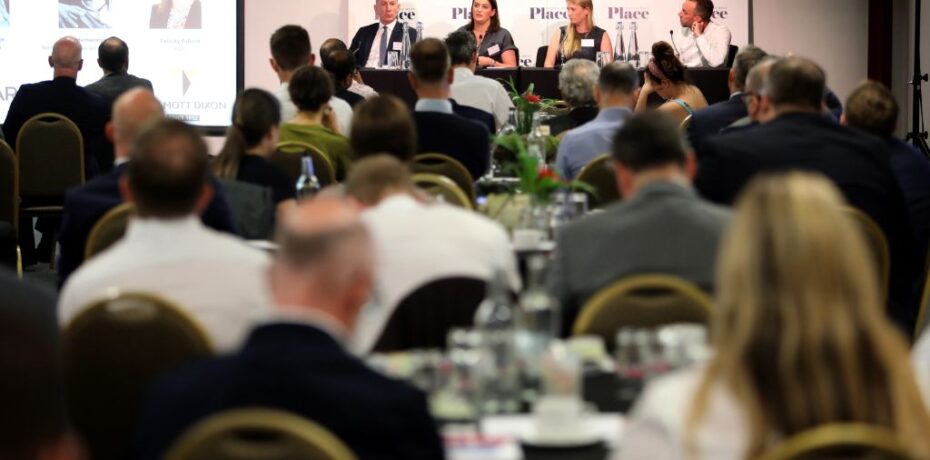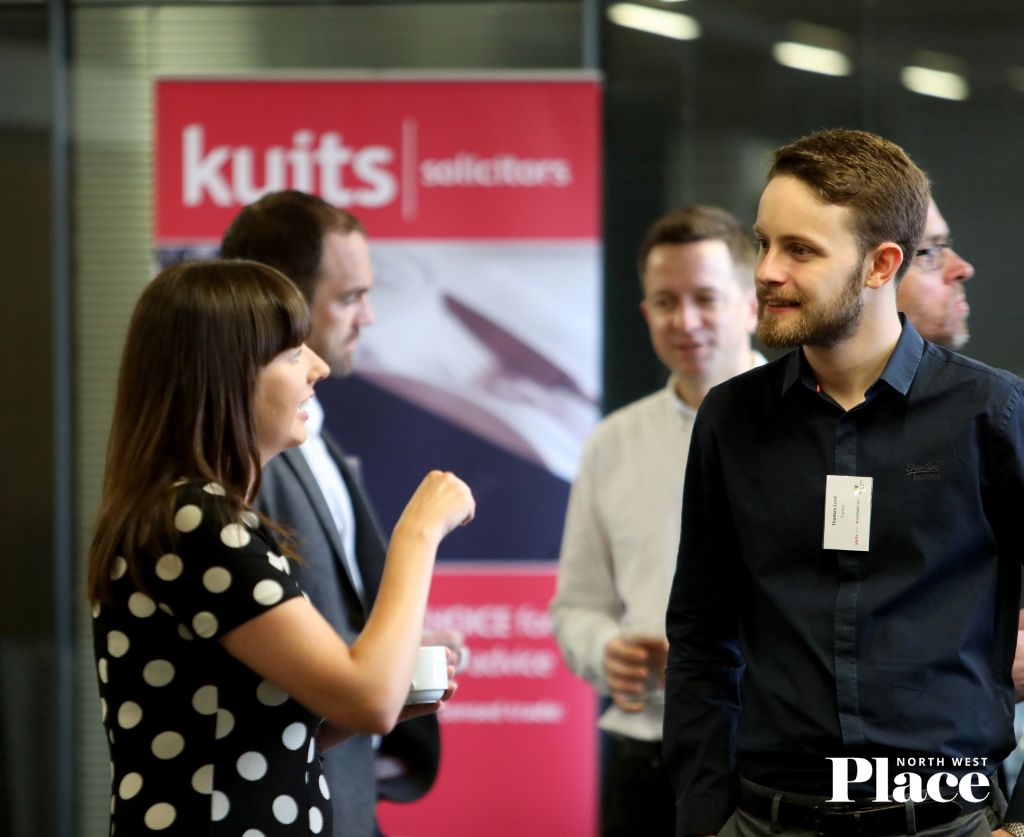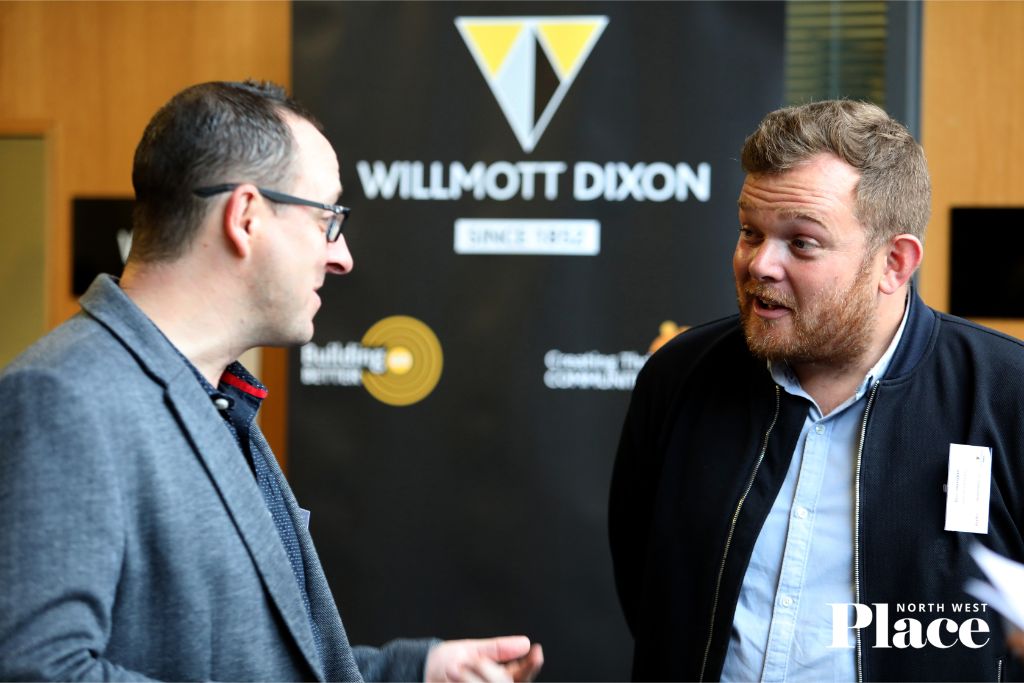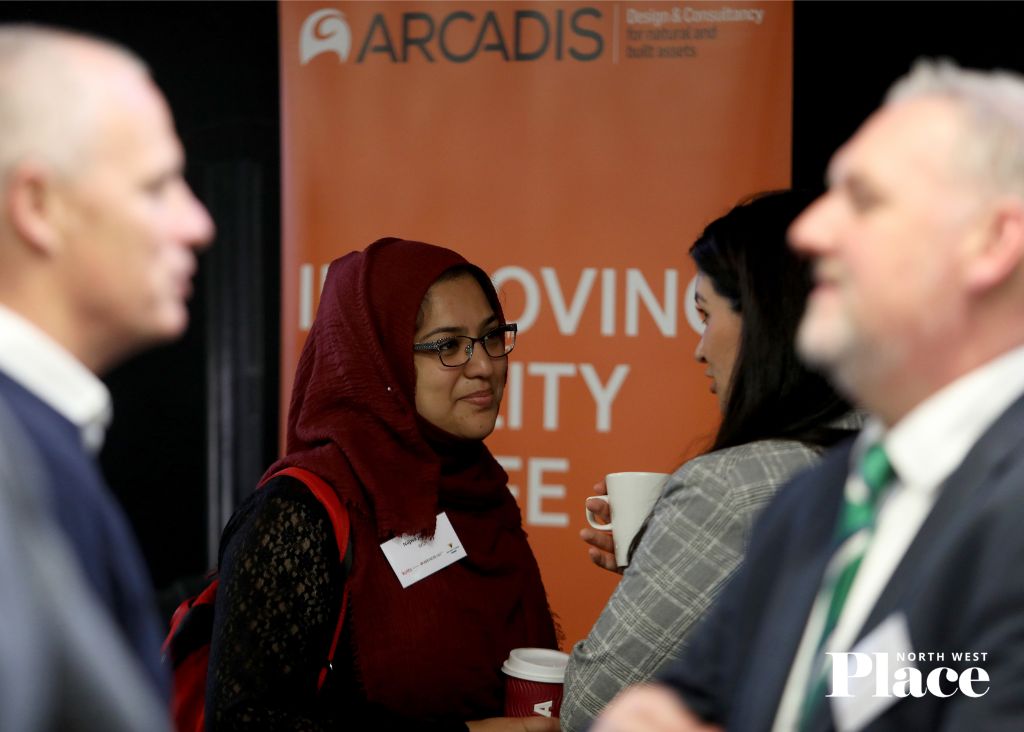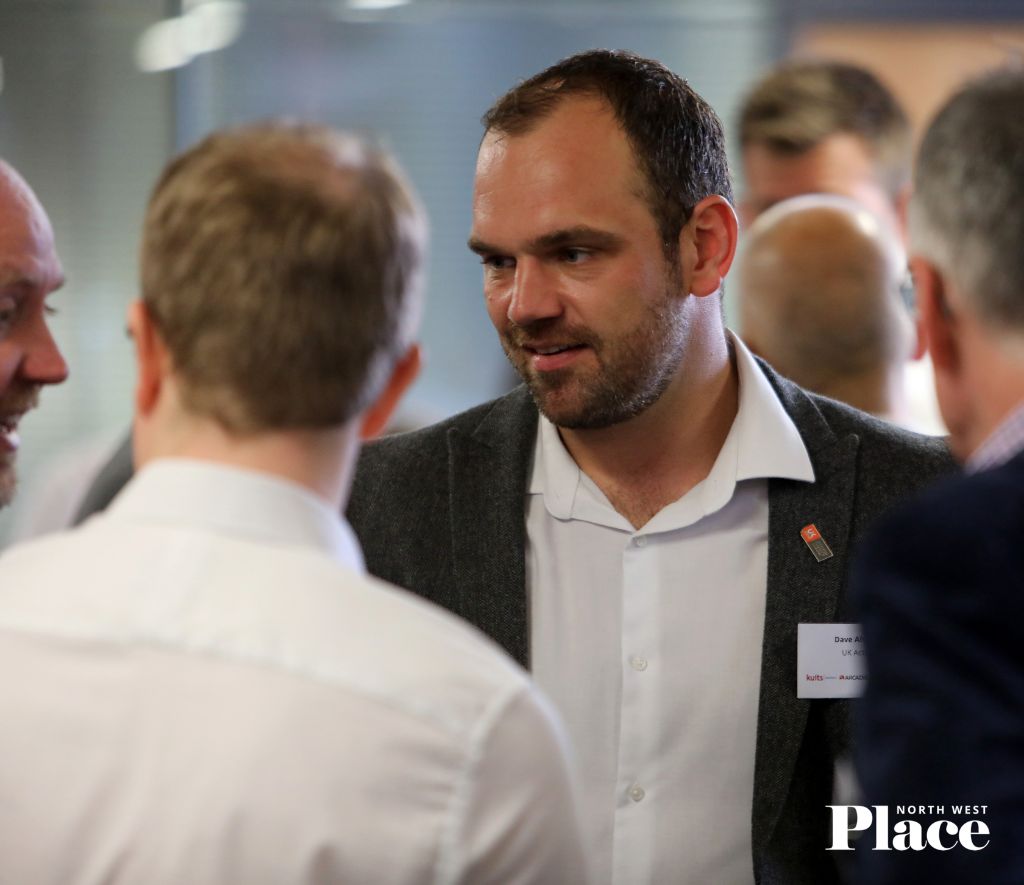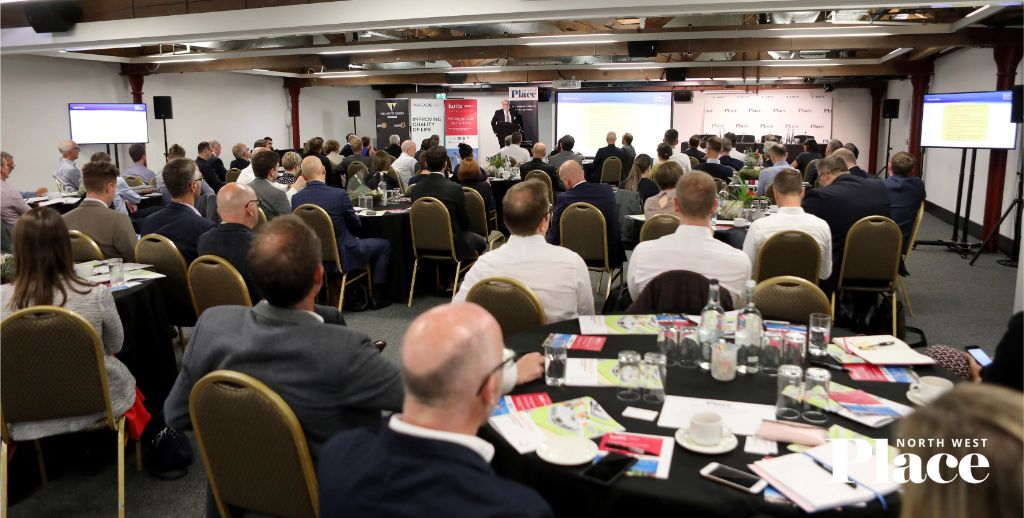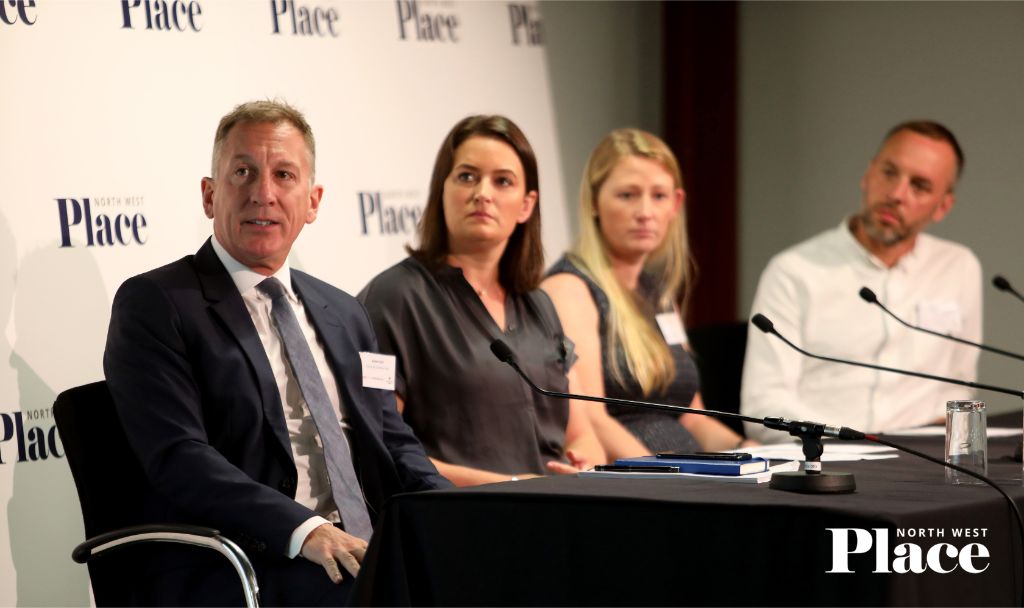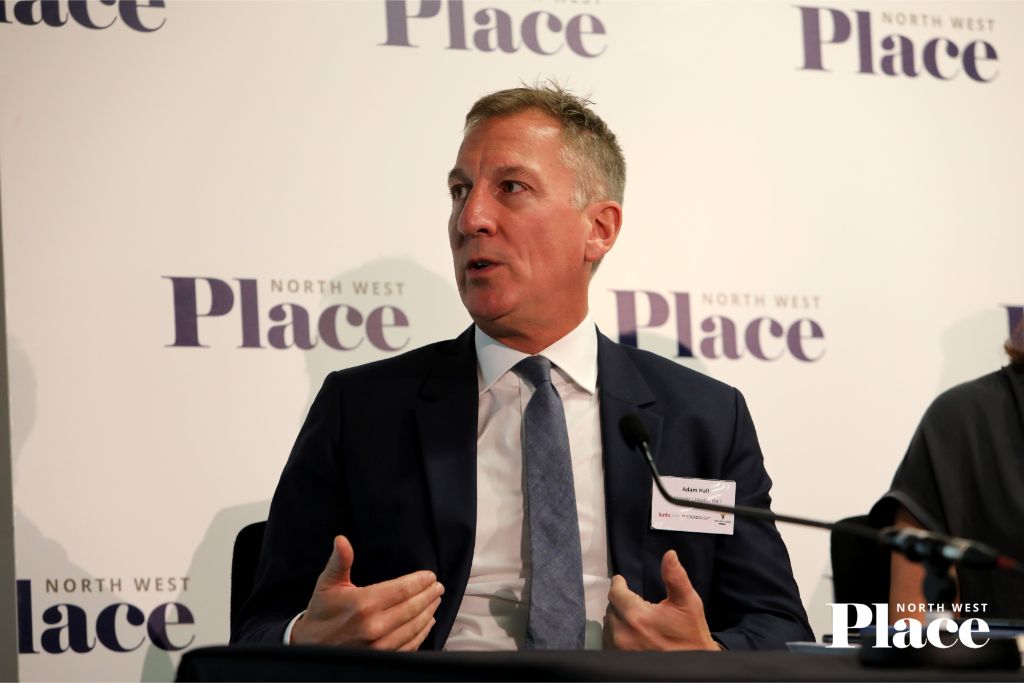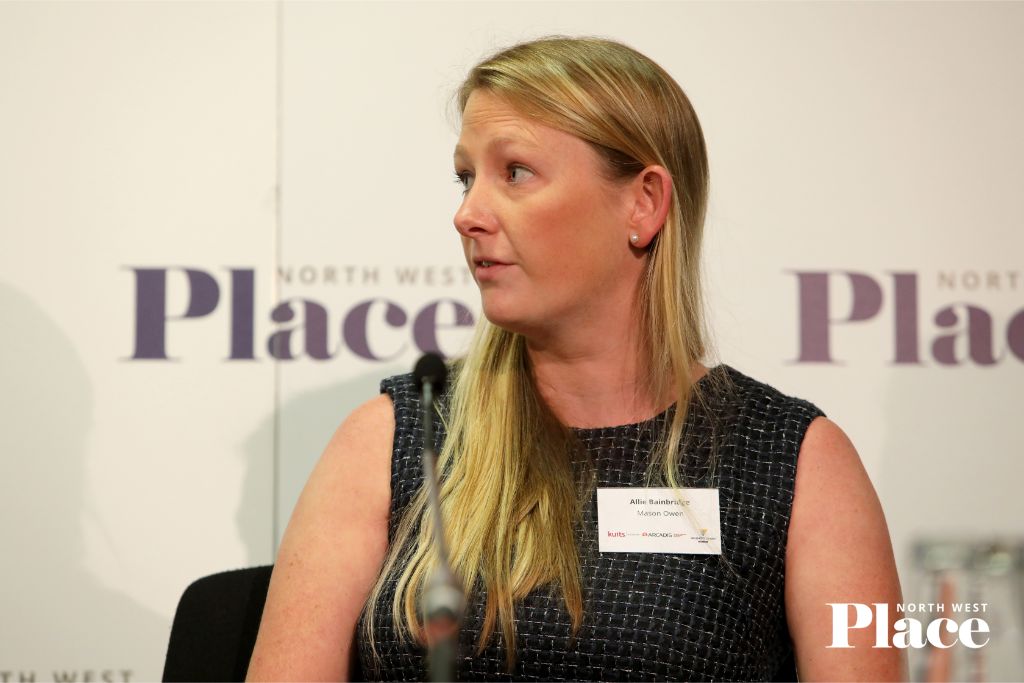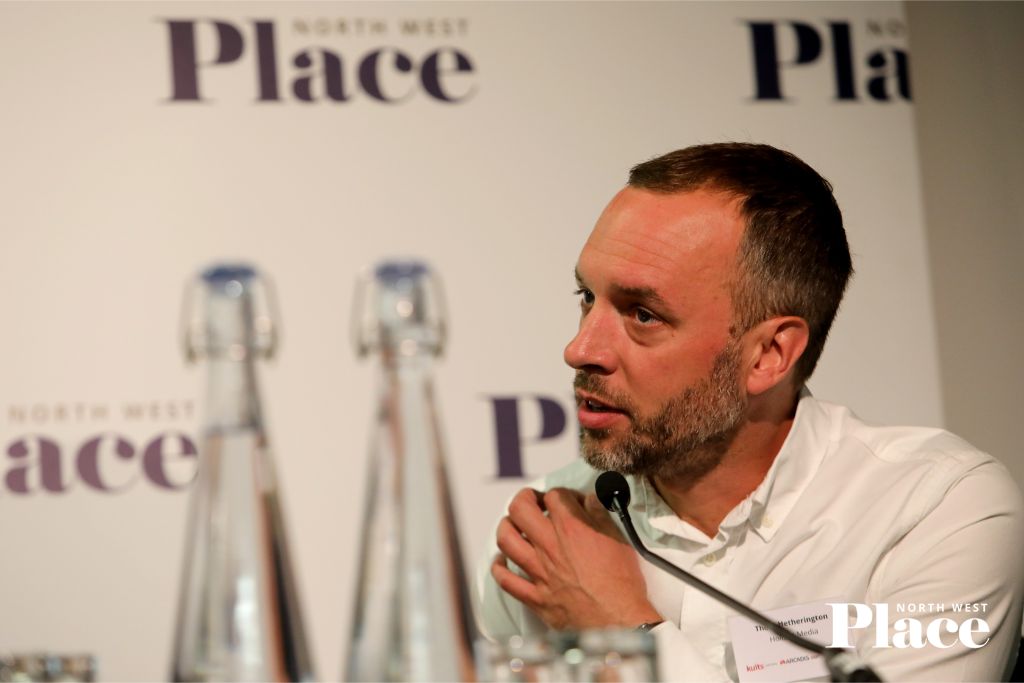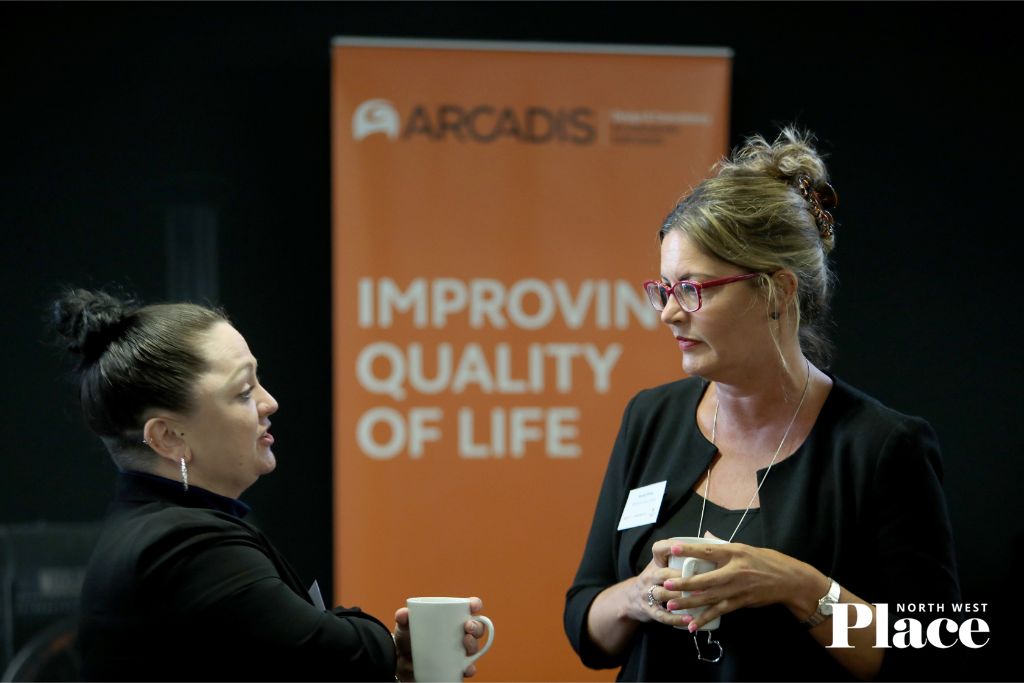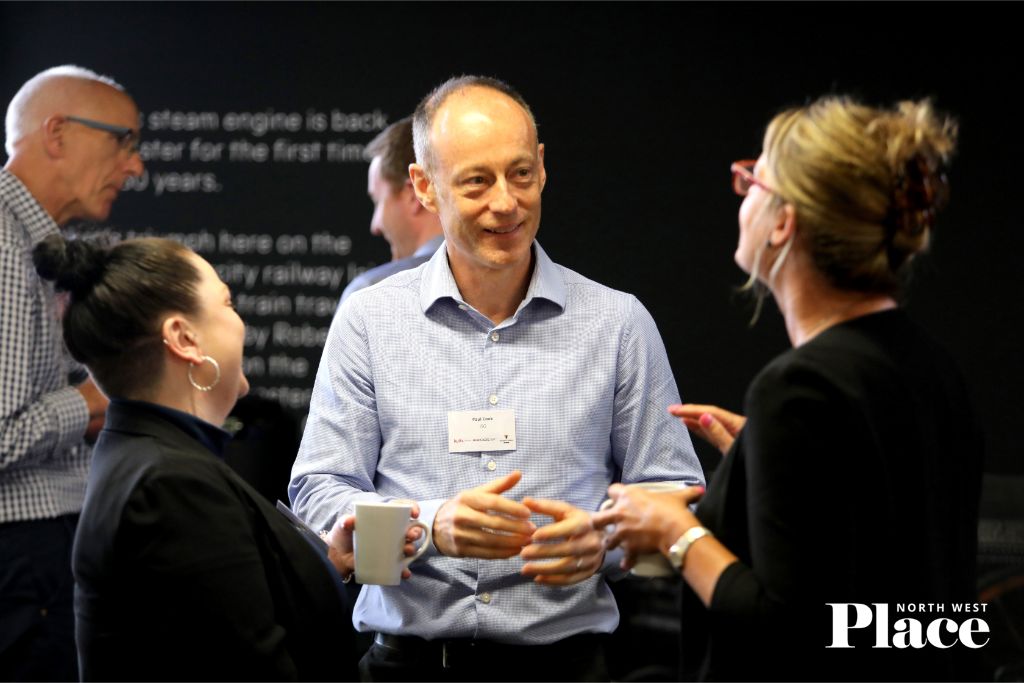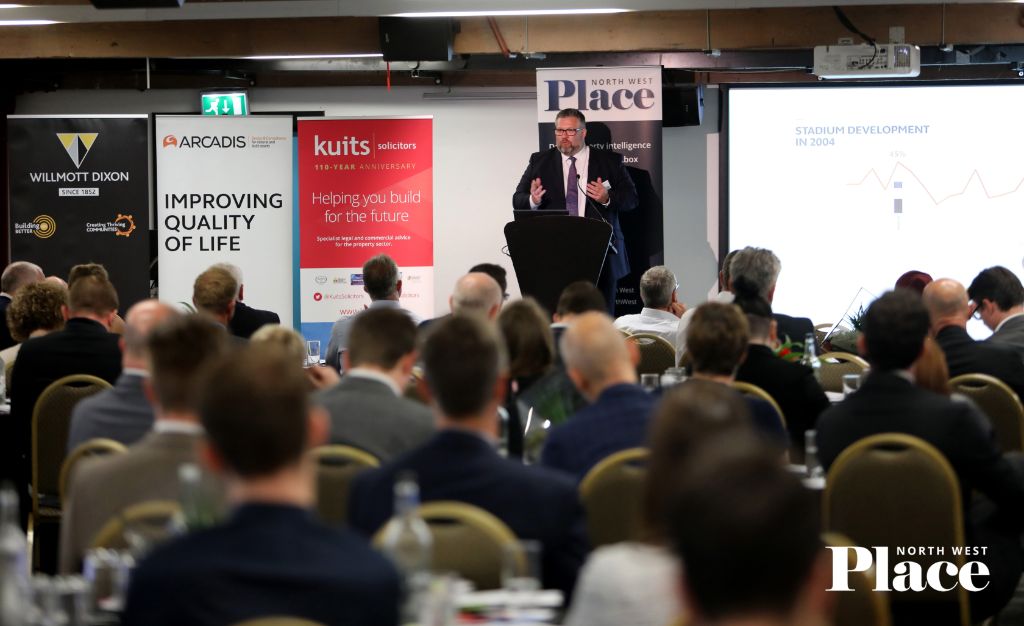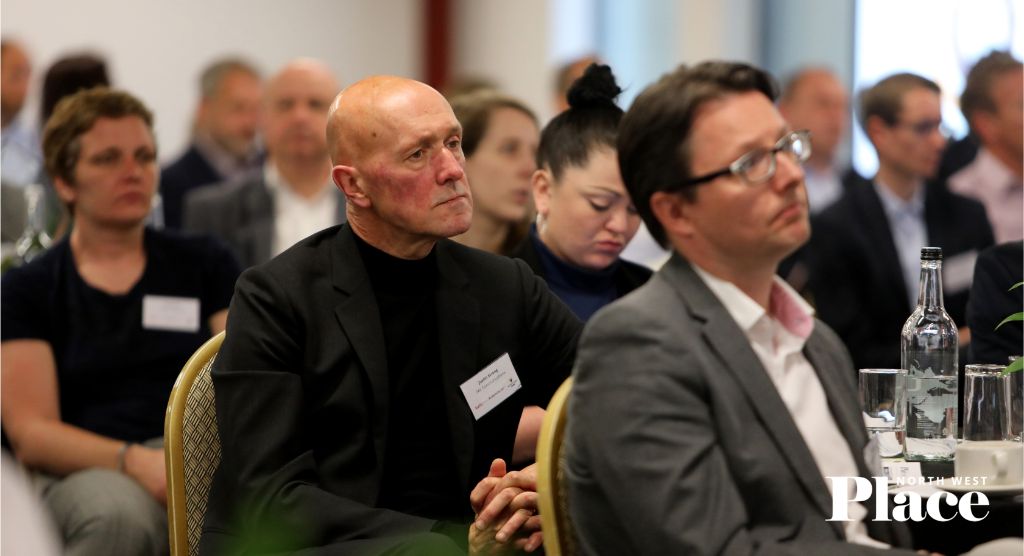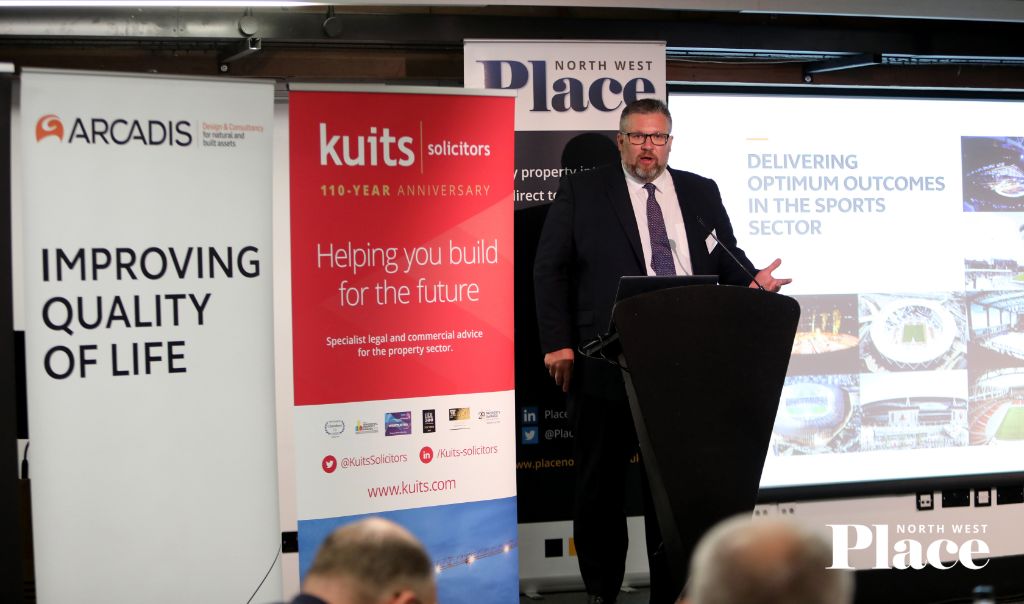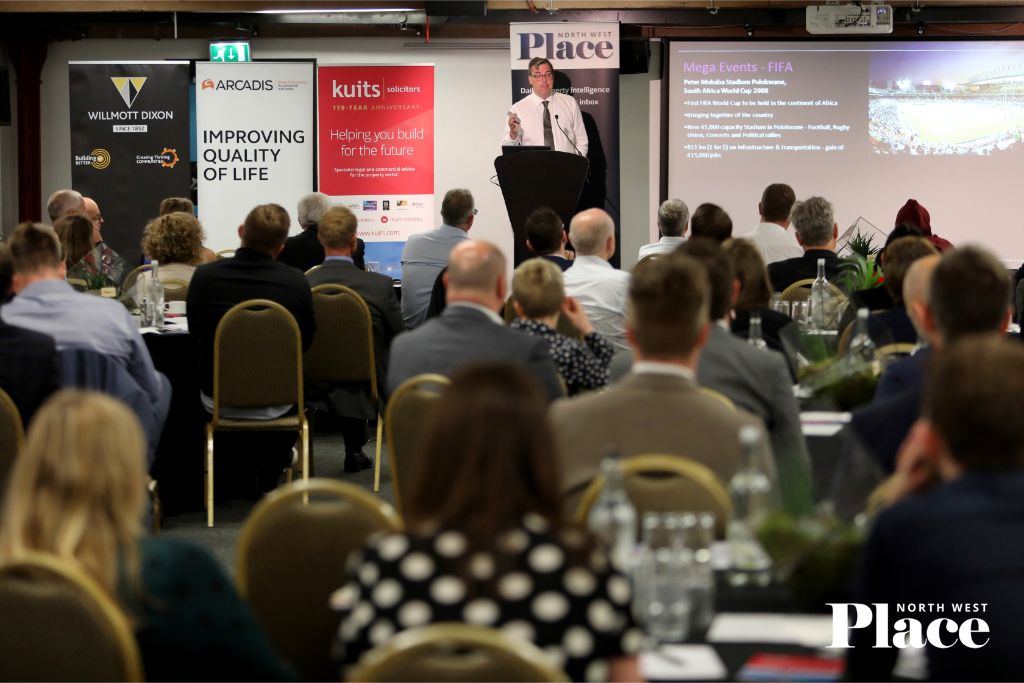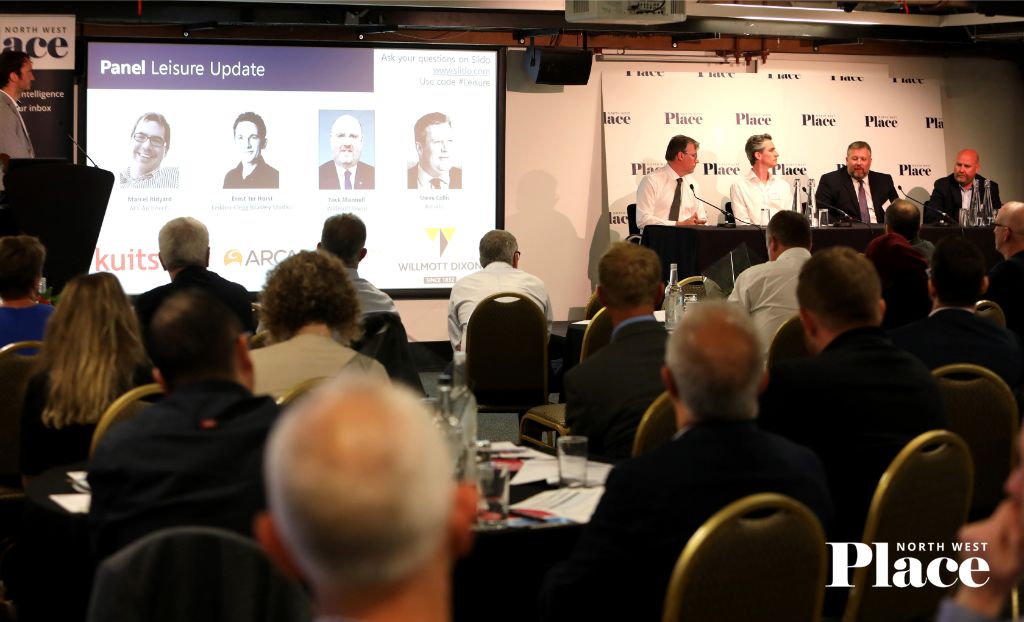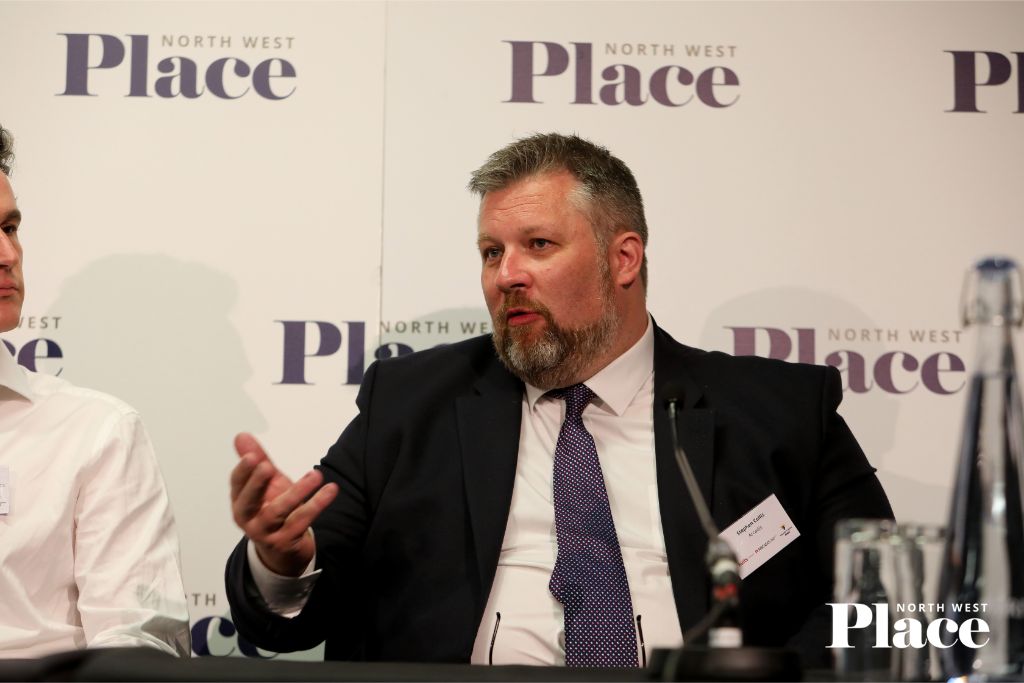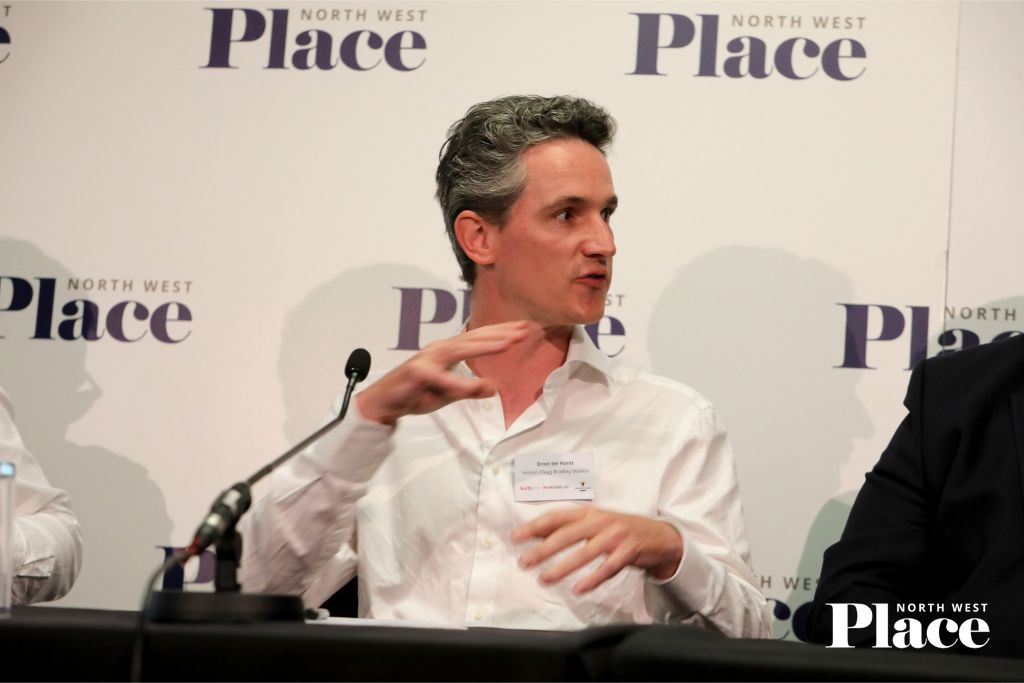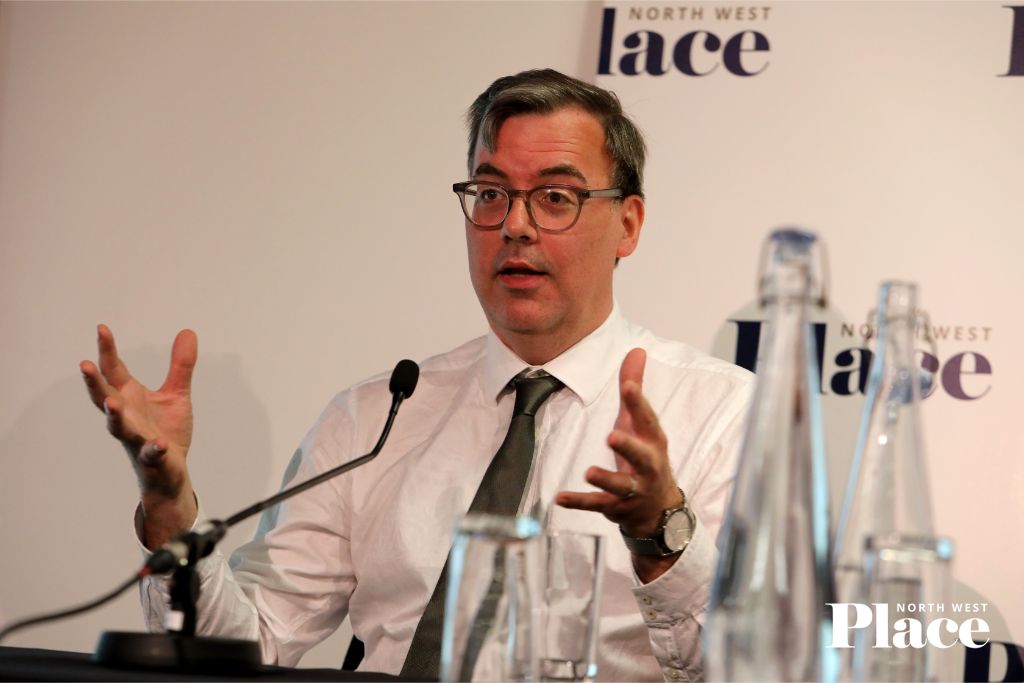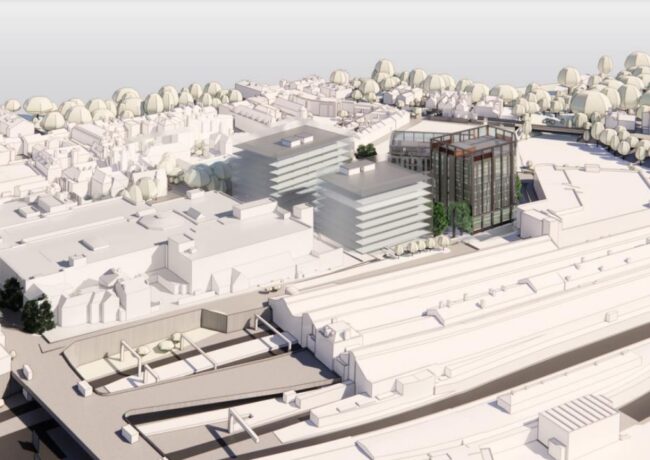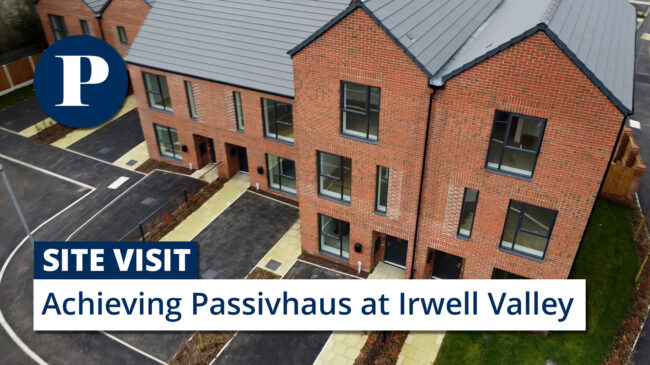Event Summary
Leisure Update: Hotels, Bars + Stadia | Summary, slides + photos
A hotel market in flux, community and corporate engagement, tech innovations, and the future of mixed uses around sporting venues were the hot topics at this Place North West event.
More than 100 people attended the half-day conference hosted at Manchester’s Science & Industry Museum, with speakers including Mark Phillips, director at Colliers International; Adam Hall, managing director at Falconer Chester Hall; Allie Bainbridge, surveyor at Mason Owen; Thom Hetherington, chief executive at Northern Restaurant & Bar Show; Felicity Tulloch, partner at Kuits Solicitors; Steve Collis, head of sports, leisure and hospitality at Arcadis; Marcel Ridyard, senior associate at AFL Architects; Nick Mennell, leisure sector manager at Wilmott Dixon; and Ernst ter Horst, associate at Feilden Clegg Bradley Studios.

The event was sponsored by Kuits Solicitors, Arcadis, and Wilmott Dixon, and was chaired by Place North West deputy editor Charlie Schouten.
Hotel market in flux
Mark Phillips of Colliers International started the event with a presentation that detailed some of the data Colliers had collected in the UK Hotel Market Index 2019 from STR Global, a service which provides data bench-marking, analytics,and marketplace insights for hospitality sectors.
- Manchester isn’t currently in the top 10 on the UK Hotel Market Index, however there is a high level of projects in the pipeline set to open next year. 801 rooms were added to supply last year, whereas only 137 have been added in 2019 so far. 1,084 more are expected to be delivered in 2020. By 2021 there are 2,943 rooms due, which represents a 25% increase on existing stock
- Liverpool is now third on the UK Hotel Market Index because of its 81.8% occupancy rates in 2018, and 7.3% revenue per available room between 2015-2018. 583 rooms were added to supply last year, with a further 626 in 2019. There are 498 expected to be delivered by 2020. By 2021 there are 1,124 rooms due which is the equivalent of 14% of the existing stock.
- One of the current issues facing hotel development is cost, including construction costs, payroll, and utilities. Phillips said that “the pressure on the bottom line is affecting the people who work there, and it’s set to remain pressured for another couple of years at least. The gross operating profit of hotel rooms is lower than it was in 2018”
- The common denominators in cities that are succeeding is that they’ve become destinations, and people want to visit for various reasons like corporate, sports, and music events. Phillips said “in Manchester, there are improved flights and road infrastructure so it’s not just local and domestic growth”
- There is significant funding available for hoteliers from new companies such as Market Hero and Maslow Capital, and from local governments. Phillips said: “One of the major issues with expansion is trying to gain planning permission from the local councils which can be complicated and time consuming”
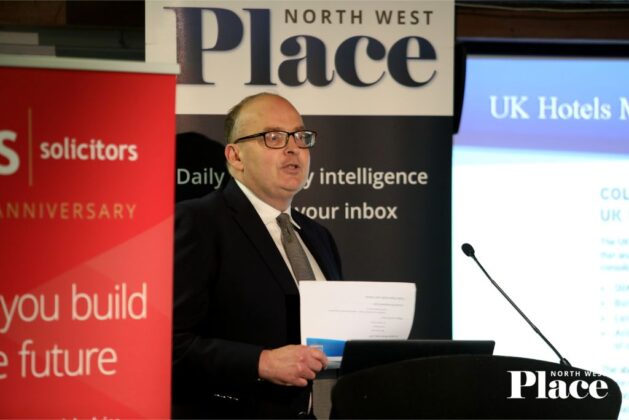
Mark Phillips, director at Colliers International
Tech is key
Phillips was then followed by Adam Hall, managing director at Falconer Chester Hall. He delivered a presentation that looked at Liverpool’s success in the aparthotel and hotel sector.
- Falconer Chester Hall has recently completed schemes Seel Street Hotel, a four-star with 128 guestrooms, and Lock & Key on Duke Street, which is also four-star and has 14 guestrooms, both of which were completed in the past eight months
- Hall put Liverpool’s rapid aparthotel and hotel expansion down to placemaking, with events such as the opening of the ACC convention centre, Chinese New Year celebrations, and Liverpool International Music Festival. He went on to say that Liverpool is set for further growth with the opening of the cruise liner terminal, and subsequent cruise terminal hotel, set to open next year
- He expects to see the role of the lobby evolve in the next few years. “The rise of co-working has led to the possibility of using the space in a similar way. The lobby is expected to become more automated and integrated with modern tech, like self-service check-in machines, and plug-and-play spaces”
- Tech is set to further change customers’ experience within hotels, such as the integration of AR to help with check in via mobile devices, help wayfinding, and give guided tours. VR will help more behind the scenes for the designers. He also expects to see a rise in more modular construction as it “fits aparthotel and hotel buildings as it provides consistent and recognisable products”
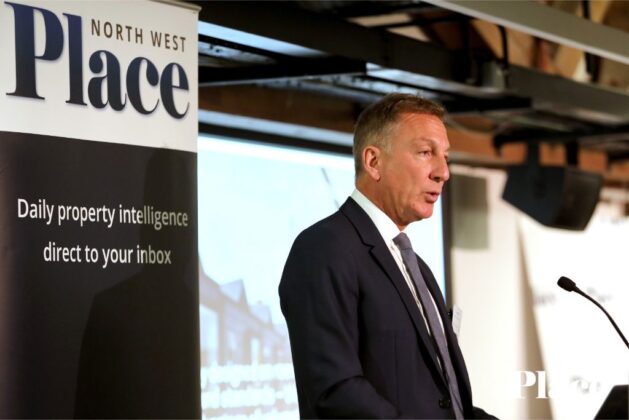
Adam Hall, managing director at Falconer Chester Hall
Engagement, engagement, and food
Hall then joined a panel featuring Allie Bainbridge, Thom Hetherington, and Felicity Tulloch.
- Bainbridge said Mason Owen clients had shifted from wanting standard hotels to more boutique and independent hotels. She also went on to say that in a market of SMEs and chain hotels: “SMEs are more cautious and slow moving when it comes to making business decisions, and it’s meant that they haven’t had as many closures as larger hotel chains”
- Thom Hetherington said engagement should be a priority for developers and landowners alike. “SMEs and startups aren’t that hard to engage with and are ambitious but people need to use modern technology and social media more to make connections”
- Felicity Tulloch said in a similar vein, “operators are using smaller indie sites that are now coming onto the market to expand their brand, and are re-purposing disused retail spaces. You can find clear examples in the Northern Quarter of this”
- He went onto say that success is based on “understanding the local market and demographic.” In terms of restaurants, he said that it “only takes one independent to change the whole feel of an area”
- The future of F&B integration into the hotel sector is not bright according to the panel. Hall said: “Millennials are there to experience the local offer and they do their research. They’re much more likely to go and check out local bars and restaurants than stay in the hotel. It’s a bonus though, it keeps the room costs down, and frees up more space for other use.” Hetherington agreed and added that “it makes hotel operations much simpler”
- In terms of food, a lot of pop-ups are utilising space that would otherwise be empty. Bainbridge said: “Flexible leases are drawing in people without the worry that their business has to be an immediate success. 90% of the time it leads to the kickstart of longer leases anyway”
- Hetherington said: “In order to attract F&B operators into a space that isn’t particularly foodie, you just need one operator to do so and prove that there is a market for it.” He went on to say that food places can become “leisure incubators, like we’ve seen with the success of Hatch in Manchester”
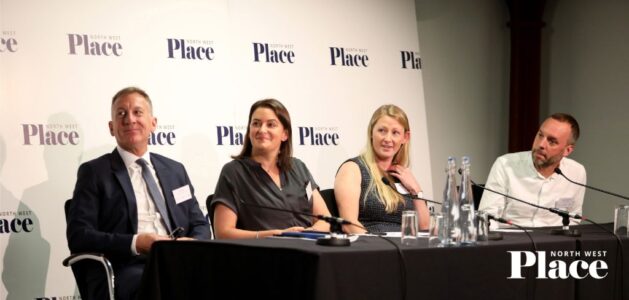
From left: Adam Hall, Falconer Chester Hall; Felicity Tulloch, Kuits Solicitors; Allie Bainbridge, Mason Owen; Thom Hetherington, Northern Restaurant and Bar Show
U.S. vs us
Following a networking and coffee break, Steve Collis gave a presentation on UK stadia in comparison to international developments, and where he sees the sector heading in the future.
- According to Collis, US stadium design compared to the UK is in a different league. “The Dallas Cowboy’s stadium in Texas is basically a 5* hotel inside a stadium.” The NFL stadium invested in a façade built around the stadium that houses retail and leisure units. The recent builds and expansions seen in Liverpool, Chelsea, and Tottenham Hotspur are heading towards America’s level, but none have reached it yet
- The way that we’ll see stadium remain relevant for future generations will be the integration of residential and retail into the local infrastructure to make them become destinations, he said. Operations need to continue beyond just the matches. Collis sees the long-term plan for stadium’s is to “contribute to the community and help regenerate areas by investing in housing in the surrounding areas and invite more retail opportunities”
- Collis said: “Tech is set to alter the experience for visitors in the future.” Stadiums are currently looking into smart energy consumption, and into creating databases of visitors to analyse trends and make the experience more tailored. Tottenham made history with the world’s first retractable pitch. They also have a sky lounge for corporate functions which hangs above the pitch
- Esports are set to boom and change the way stadium are used. Collis explained that at a recent esports event in China, over 70,000 people attended, and “more and more people are setting up esports venues, or at least considering the implications of doing so”
- Collis thinks that the North West is secure in its stadium sector due to the successes of its sports teams, and their density in the region. This is despite the challenges in the construction sector with investors concerned at the strength of business in light of Brexit. “There needs to be more flexibility and vibrancy for a location for it to flourish. The north, with its heritage, successes in football and netball amongst other sports, paints a bright picture and will push our boundaries”
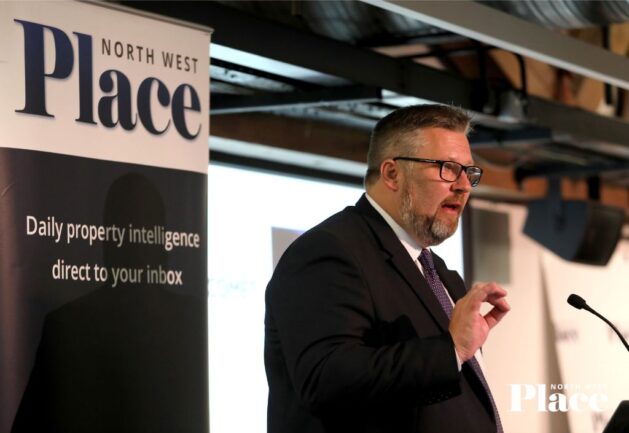
Steve Collis, head of sports, leisure and hospitality at Arcadis
Stadium impact
Collis was followed by Marcel Ridyard, senior associate at AFL Architects. Ridyard gave a presentation on how to measure the impact of stadium, and the economy and emotional aspects which are just as vital as the other.
- While emotional impact is intuitive and can’t be measured by conventional means, the economic outcome is objective and can be scientifically analysed. The pair together show the impact of a city after a stadium has been built
- Ridyard went on to compare two stadia, Manchester City’s Etihad Stadium and the Cardiff’s Millennium stadium. The choice to build the Etihad just outside of the city centre in an area of deprivation not only helped regenerate the area but was a catalyst for a city centre boom, and reconnected parts of the city that were previously forgotten
- The Millennium stadium was built in Cardiff city centre. Originally, Cardiff locals were unhappy about the amount of people that the stadium attracted and closed at the weekends to avoid crowds, but eventually they realised the opportunity and Cardiff began to boom
- Ridyard said: “You’ve got to know where to put these venues, as you need an economic business base. You need commercially astute managers who know the area”
- Salford rugby stadium was built during the recession, and “hasn’t really kicked off”. Ridyard believes that with the new bypass that connects the Trafford Centre, a Metrolink tramline extension, and Peel building out the land, as part of a 20/30-year plan it could very well become successful
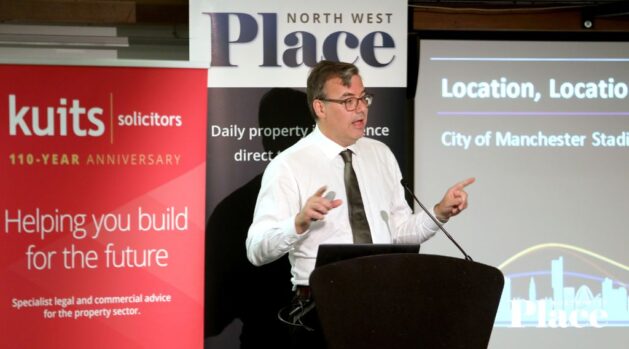
Marcel Ridyard, senior associate at AFI Architects
Ridyard and Collis then joined a panel featuring Nick Mennell and Ernst ter Horst.
- Collis said that in order to get the owners of football clubs a bigger return you should have “strategic and dynamic benchmarking.” He went onto say that you don’t need architects or designers in the beginning, “the economic impact is more important than the image. How many masterplans do we see that don’t get off the ground?”
- ter Horst said that “people can be angry and vociferous about stadium when there is no area management after the event.” To assuage fears, he agreed that the integration of “leisure units and working with the community like Bruntwood and Manchester City Council are on Trafford’s Civic Quarter masterplan and Manchester Cricket Club, will help create a vision that works on sites that have a cohesive whole”
- Mennell said that clubs like AFC Wimbledon, which is currently undergoing a £30m move, are “communicating with the community to create a mixed-use development that has a cross sector with work and health. We’re creating destinations rather than a space”
- Ridyard said where the arena market will work is by having a mix of venues, whereas the proposal for another Manchester Arena will probably not be as successful. “Where Manchester venues will work will be in old cinemas and disused buildings, like Albert Hall which is charming. There’s enough people in Manchester to fill venues, but they’ve got to be different scales and different venues”
- Responding to a question regarding the growth of the esports market, Collis said that he pictures VR becoming more integrated in sports, with “players wearing cameras on their t-shirts”. He said that in the next 10-15 years we’re likely to see a revolution of how we consume sport. “Will people pay a lot of money for tickets in the future, do GenZ want to pay this much for a ticket? You can appeal to the heritage and tradition of going to the club with the family, but you’ve ultimately got to keep an eye on the fan with loyalty schemes”
- In response to a question about taking cars out of the equation with an improved transport network, Collis said: “Arcadis are currently looking into driverless cars” but at a recent big masterplan meeting, stadiums were still planning for “4,000 car parking spaces, and were thinking about how deep we should dig into the ground to provide them. There’s going to be a revolution in car transport too and we’ll need to alter our plans in light of it. You can get an Uber nowadays, but one day there will be Ubers without a driver, and battery-operated cars will one day be on the market, and these are all considerations we need to get a round table of experts talking about”
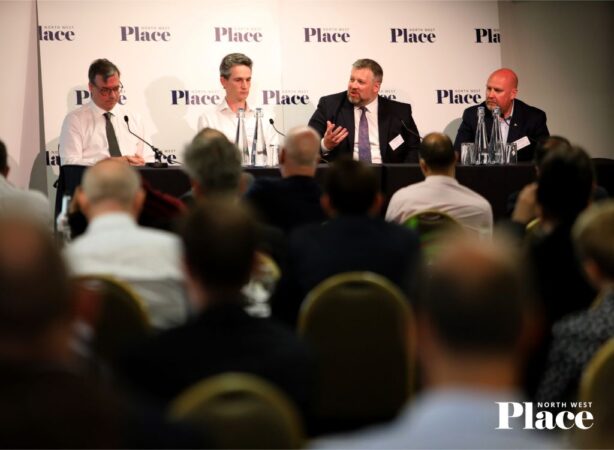
From left: Marcel Ridyard, AFI Architects; Ernst ter Horst, Feilden Clegg Bradley Studios; Steve Collis, Arcadis; Nick Mennell, Wilmott Dixon
The presentation slides can be accessed below:
Mark Phillips, Colliers International
Adam Hall, Falconer Chester Hall
Marcel Ridyard, AFI Architects
The next Place North West conference is Future of Retail on Thursday 12 September.
Find details of all upcoming Place events here.
Click any image below to launch the gallery
- The Urban Botanist exhibited terrariums around the event
- Mark Phillips, Colliers International
- Mark Phillips, Colliers International
- From left: Adam Hall, Falconer Chester Hall; Felcitiy Tulloch, Kuits Solicitors; Allie Bainbridge, Mason Owen; Thom Hetherington, Northern Restaurant & Bar Show
- Adam Hall, Falconer Chester Hall
- Allie Bainbridge, Mason Owen
- Thom Hetherington, Northern Restaurant & Bar Show
- Felicity Tulloch, Kuits Solicitors
- From left: Adam Hall, Falconer Chester Hall; Felcitiy Tulloch, Kuits Solicitors; Allie Bainbridge, Mason Owen; Thom Hetherington, Northern Restaurant & Bar Show
- Steve Collis, Arcadis
- Steve Collis, Arcadis
- Marcel Ridyard, AFI Architects
- From left: Marcel Ridyard, AFI Architects; Ernst ter Horst, Feilden Clegg Bradley Studios; Steve Collis, Arcadis; Nick Mennell, Wilmott Dixon
- Charlie Schouten, deputy editor Place North West
- Nick Mennell, Wilmott Dixon
- Steve Collis, Arcadis
- Ernst tor Horst has warned of the impact coronavirus could have on the industry
- Marcel Ridyard, AFI Architects
- From left: Marcel Ridyard, AFI Architects; Ernst ter Horst, Feilden Clegg Bradley Studios; Steve Collis, Arcadis; Nick Mennell, Wilmott Dixon


